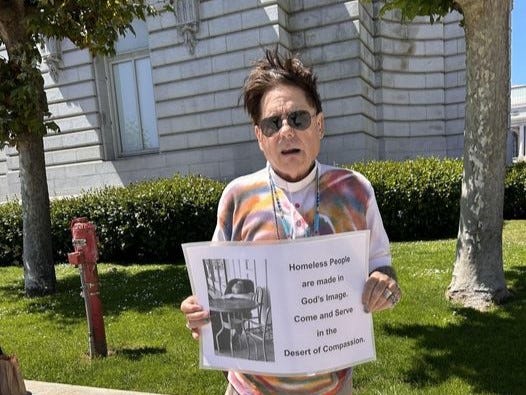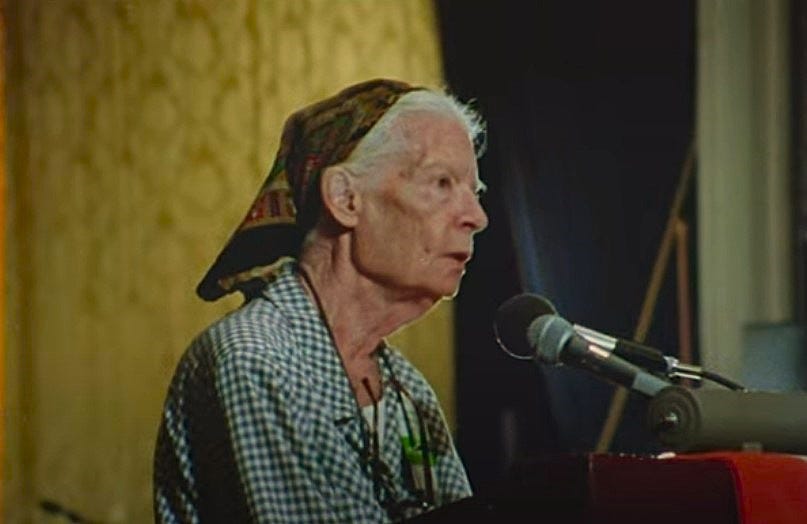In the Philippines, Nazareth House Welcomes Those with HIV/AIDS
Also: Second Uganda CWer in detention; film of Dorothy and Dom Helder Camara; Hiroshima observances; Apache-Stronghold pilgrims; and a peace activist's mountain bike ride for Gaza.
Acting Together
Although Mary House Catholic Worker shuttered in 2023 after years of providing hospice services for aging homeless patients, its spirit endures as people continue to come together to work for social justice in other forums.
As a public school mom in the Round Rock Independent School District here in Austin, Texas, I’ve found a collaborative community of service at the other end of the age spectrum, in Clothes Closets run by the PTA that serve our many low-income families in the school district. I recently took part in a back-to-school event hosted by Families in Transition, the team of district staff who work specifically with students experiencing homelessness.
My little table was squeezed in by the front door, and my role was to, in my limited Spanish, invite families to access the Clothes Closets. “Lo siento, solo poquito español” (“Sorry, only a little Spanish”) was a phrase I uttered countless times over the course of the day as I stumbled through welcoming phrases and basic introductions. More than once, I was met with friendly laughter and the return phrase, “Solo poquito English!”
The blending of clients and volunteers, English and Spanish, moms and neighbors, is part of why I love being at the Clothes Closets: the sense of community. As customers shop for a free, full week’s worth of school clothes for each of their children, volunteers—some of whom are former or current clients—sort and hang donated clothing. Conversation flows freely in multiple languages around children, chores—even childbirth. During my first shift this week, a long-time volunteer who speaks only Spanish gave us a rundown of her four children’s births: Cesarean and back labor are terms that easily cross the language barrier!
Energized by my experiences and preparing for this week’s Roundtable, I searched Dorothy Day’s writings for text relating to school. Speaking from over 100 years ago, in the “Few Good Words” that close this issue, she shared the heartache of parents in poverty. At the age of 20, before her conversion and the start of the Catholic Worker movement, she recognized needs that, working together, we now strive to mitigate.
As I was thinking about this spirit of community, I realized my artwork featuring St. Vincent de Paul speaks to this spirit well: “Proceed quietly, pray a great deal, and act together,” he advised. My artwork pulls from both potential meanings of “act together”: group service projects, such as those that put together backpacks full of school supplies; and coming alongside another person to connect and make meaningful change, like what happens while we sort clothing donations side by side. I painted both figures with halos as reminders of my favorite verses that call us to this work: “Be not forgetful to entertain strangers: for thereby some have entertained angels unawares” (Hebrews 13:2) and “as long as you did it to one of these my least brethren, you did it to me” (Matthew 25:40).
As temperatures start to fall, and schedules fill up, I hope this issue energizes you with news of Catholic Worker efforts towards change in our communities—around the corner, the country, and the globe.
—Monica Welch
Monica Welch coordinates art for Roundtable. If you have art to share, reach out at roundtable@catholicworker.org.
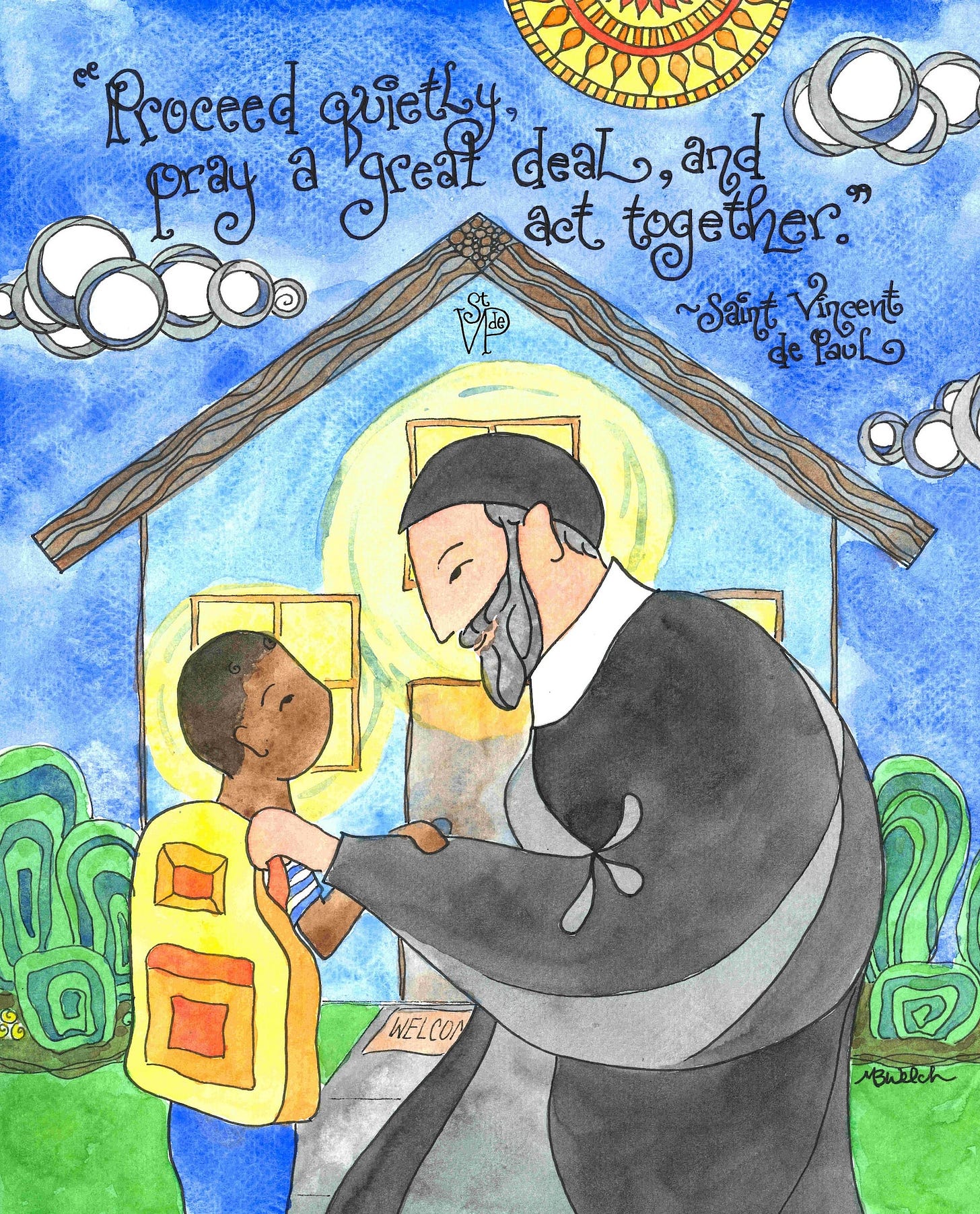
FEATURED
In the Philippines, Nazareth House Welcomes Those Living with HIV/AIDS
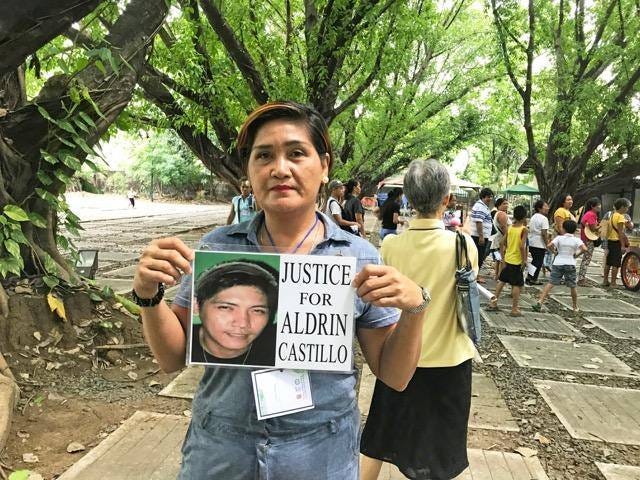
About ten years ago, Noel E. Bordador was a social worker in New York City, working with unhoused persons living with HIV/AIDS. As dire as the situation was for his clients, Bordador knew things were even worse for people living in the Philippines, where he was born and spent his childhood until his family immigrated to the United States. The social stigma surrounding homosexuality has helped fuel the spread of HIV/AIDS at the fastest rate of any country in the western Pacific, with infected individuals often afraid to seek treatment and sometimes disowned by their families.
After volunteering at the New York Catholic Worker’s Joseph House, he had an idea: Why not start a Catholic Worker in Manilla specifically for people with HIV/AIDS?
That’s how he came to open Nazareth House Catholic Worker (known locally as Bahay Nazareth) in the house that once belonged to his grandmother in December 2016.
This week, Scarlett Ford interviewed Bordador about the work the community has been doing over the past eight years: providing long-term hospitality for guests living with HIV/AIDS, doing outreach to those living with HIV/AIDS in the wider community, delivering food to people on the street via “Dorothy’s Kitchen,” and standing in solidarity with the families of individuals murdered by the police or vigilantes in the government’s brutal war on drugs.
Like Dorothy, Bordador’s approach to hospitality has been especially influenced by the spirituality of St. Thérèse of Lisieux’s “little way.”
“This is a place of belonging, not just a shelter,” Bordador told Scarlett. “It has become sort of like a family; that sense of community is one of the most stabilizing aspects in life.”
Read the whole story at CatholicWorker.org.
An Invitation to the Desert of Compassion
In response to California Governor Gavin Newsom’s recent order to clear homeless encampments, Dr. River Sims of the Temenos Catholic Worker (San Francisco) has been out demonstrating in front of city hall. An interaction with a bystander prompted this reflection, shared on their Facebook page:
A friend would say to me, “You are acting like a little child!” when she was frustrated with my actions; Blessed Carlo Acutis, 15, once said: “All people are born originals, but many die as photocopies!” I am not a photocopy, I do my best to be a “little child” in the Kingdom of God.
Jesus talked about being born in the Spirit as children, wide-eyed, innocent, embracing all people without judgment.
A young woman approached as I stood in front of City Hall, happy about the Mayor's and the Governor's plans of clearing the streets of homeless people; she believed they should be moved out of “our way” and not make us feel “guilty.” They should be held “responsible.”
I listened, smiled, remembering two quotes:
Compassion asks us to go where it hurts, to enter into the places of pain, to share in brokenness, fear, confusion and anguish. Compassion challenges us to cry out with those in misery, to mourn with those who are lonely, to weep with those in tears. Compassion requires us to be weak with the weak, vulnerable with the vulnerable, and powerless with the powerless. Compassion means full immersion in the condition of being human! (Henri Nouwen)
and
There is no wilderness so terrible, so beautiful, so arid and so fruitful as the wilderness of compassion. It is the only desert that shall flourish like the Lily, for true solitude in the desert is walking, and caring for, those no one else will touch!" (Thomas Merton)
Personally, these words call me to Center on Jesus: trust is not to be feared.
My calling is to be a “Story Catcher”: one who will listen and will catch each person’s story and hold no judgment, loving the person without judgment!
I would like you to become a “little child,” and see each person around you with fresh, bright eyes, without judgment! Deo Gratias! Thanks be to God!
Temenos Catholic Worker works with homeless street youth providing pastoral care, harm reduction, crisis intervention, and HIV education and prevention. The community is begging for money and supplies; see their Facebook post for details.
A Call to Repent from Nuclear Sin

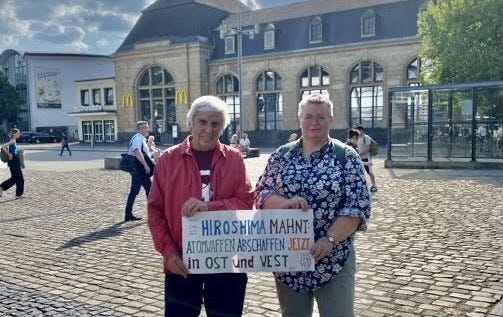
THE ROUNDUP
Elizabeth Nakiwolo, a 37-year-old mother of three young children and one of the founding members of the Uganda Catholic Worker, has been held by authorities in a series of detention centers since June 9, according to Michael Sekitoleko. He and Nakiwolo were among a group of activists seeking to help residents of Kiganzi village who faced displacement as a result of an illegal land grab. Several of the activists, including Sekitoleko and Nakiwolo, were arrested. (See Roundtable, July 7.) Sekitoleko was released in early July, but spent several weeks in the hospital before being able to track down Nakiwolo. Roundtable will have more about this story in next week’s issue.
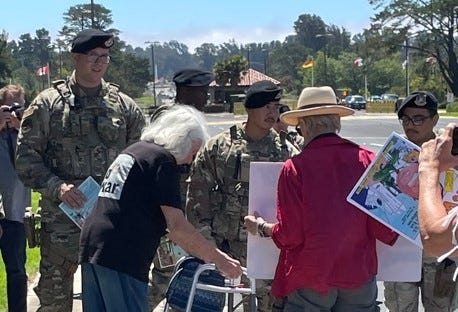
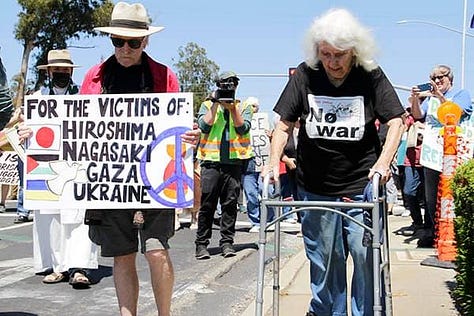
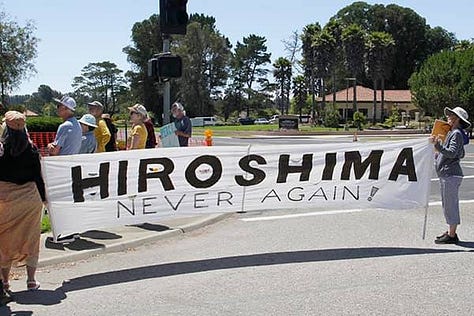
A group of 75 people marked the 79th anniversary of the atomic bombing of Hiroshima and Nagasaki with a peaceful protest at Vandenberg Space Force Base on California’s central coast on Saturday, August 10. Los Angeles Catholic Worker founders Jeff Dietrich and Catherine Morris marked their 50th wedding anniversary by renewing their vows at the event. After the vows were exchanged, the couple, along with three others—Frank Cordaro, Nuri Ronaghe, and Dimitri Kadiev—crossed onto base property in an act of civil disobedience. All five were promptly arrested, cited for trespassing, and released. See more photos and watch a video at the Los Angeles Catholic Worker website.
“Some of these companies, they just really hate us…because we're small, we're just like a little fly in the ointment trying to irritate them,” Sister Barbara McCracken told the StarTribune newspaper for a recent article on her order’s shareholder activism. McCracken was part of the live-in community at Shalom Catholic Worker House in Kansas City for ten years before joining the Benedictine Sisters of Mount St. Scholastica. Now, she leads the nuns' corporate responsibility program, taking on “the likes of Google, Target and Citigroup — calling on major companies to do everything from AI oversight to measuring pesticides to respecting the rights of Indigenous people,” according to the article.
The Little Platte Catholic Worker Farm is inviting everyone to their founding “land-warming and celebration” on their farm property near Platteville, Wisconsin, on September 21. The event will feature a potluck, land blessing, and bonfire. Get more details at the event page on CatholicWorker.org.
The St. Louis Catholic Worker will be hosting pilgrims from Apache-Stronghold as they travel across the country “collecting prayers and sharing about their struggle along the way.” The group is traveling across the U.S. on their way to the U.S. Supreme Court, where they will appeal the Ninth Circuit Court’s ruling that gave the go-ahead for a proposed copper mine on the site of Chi’chil Biłdagoteel ("the place where the Emory oak grows”), commonly known as Oak Flat. The group has been fighting the mine for 20 years, saying that the sacred site is essential to the practice of their religion and that its destruction would impede their First Amendment right to freedom of religion. The CW community will gather with the group for a prayer service at a local park the evening of August 27; details at this Facebook post.
“For me, it is not enough to march every week because we are asked to make the most of the gifts God has given us,” writes Anne Jones, an 82-year-old peace activist who recently cycled up the 1,900-foot Mont Ventoux in the foothills of the Alps in order to raise money for children in Gaza. “In my case, I am blessed with health and strength sufficient to know that, with some training, I can confidently suggest a ride like this.” Jones reflects on her reasons for undertaking the ride in the summer 2024 issue of The London Catholic Worker newspaper.
Other articles in the summer issue of the London Catholic Worker newspaper include a reflection on the journey of personal spiritual growth and conversion by Br. Johannes Maertens; excerpts from Called to be Peacemakers, the pastoral letter on arms control and disarmament released by the Catholic Bishops of England and Wales in May; a first-hand account by Rose Chacko about life in Palestine under occupation; and a piece by Thomas Frost on the Labour Party’s “failure to comfort the afflicted and afflict the comfortable.” Also, the issue includes an article calling for the release of the Senegalese teenager Ibrahima Bah, sentenced to prison for “facilitating illegal arrival to the UK, and four counts of manslaughter by gross negligence” when the boat he was forced to pilot broke up, leading to the drowning of four asylum seekers.
“Afflict the Comfortable” is a new podcast launched by Romero Catholic Worker House (Ames, Iowa) and aired on a local radio station; you can catch it on YouTube and wherever podcasts are streamed. The first episode is a conversation with founders Matt Mitchell and Liam about how they started the house in 2020. Matt was inspired to undertake the project after a life-changing encounter with someone living in poverty, he said. Mitchell will be entering the seminary this fall; David Thielen is replacing him as the house’s executive director, according to the community’s latest newsletter.
The Dorothy Day Guild recently discovered footage of Dorothy Day speaking with Brazilian Archbishop Hélder Câmara at Maryhouse and speaking at the 1976 International Eucharistic Congress; the footage is part of a short documentary film, Excuse Me, America, about Câmara’s work on behalf of the poor both in Brazil and around the world. Other footage features Mother Teresa and Cesar Chavez, as well as protesters outside the Congress. Besides the conversation with Câmara, the film shows Dorothy receiving laughter and warm applause for her opening line at the Congress: “It was almost easier for me to stand before a judge and go to jail on other occasions” than to speak before the Congress. Watch the section featuring Dorothy beginning at the 33:31 mark. Read the Dorothy Day Guild’s latest email newsletter for thoughts on the recent National Eucharistic Congress, prayer requests, upcoming events, and more.
Catholic Worker Art Week will be taking place at Mustard Seed Farm (Ames, Iowa) from Wednesday, August 21, through Tuesday, August 27. Activities will include fabric printing, painting, community harvests, and a canning workshop, with various ongoing art projects and general farm work throughout the week. RSVPs are required for all events; get details at their website.
“You have been a voice in the wilderness and a shining light to the blind!” Dorothy Day wrote to Marjorie Baroni, a civil rights activist in Natchez, Mississippi. Although Baroni is well-known to civil rights historians, her legacy is virtually unknown in her hometown or in Mississippi generally, write Terry Meng and Peter Dreier in an article in Mississippi Today. It was Day’s writing that had inspired Baroni to begin resisting the Jim Crow laws, and the two had a 27-year correspondence that lasted until Day’s death, with Day occasionally visiting her in Natchez. At the time Day wrote her words of encouragement, the local KKK was threatening Baroni and her family, firing shots at their house and attempting to bomb it, and the family was completely ostracized, even at their Catholic parish. Read the full story of her life: It is time for Mississippi to celebrate Marjorie Baroni
CALENDAR
August 22 | St. Francis Catholic Worker, Chicago, Illinois
St. Francis House Roundtable Discussion
August 27 | St. Louis Catholic Worker, St. Louis, Missouri
Multi-Faith Prayer Gathering
September 6-7 | Chicago, Illinois
Peter Maurin Conference
September 12-15 | Sugar Creek, Iowa
Midwest Catholic Worker Gathering
September 21 | Platteville, Wisconsin
Little Platte Catholic Worker Farm Landwarming and Celebration
October 4-6 | St. Francis Catholic Worker, Chicago, Illinois
Catholic Worker National Gathering
A FEW GOOD WORDS
There is Not Enough to Eat in the House, and Children Are Perforce Sent to School Hungry
by Dorothy Day in the New York Call, November 26, 1917
Dorothy would have just turned 20 years old earlier in the month when this was published. —eds.
The old-fashioned cutters in the tailor shops are no longer in demand, so Mike Rabinowitz is without his job. He lives down on Cherry street with a wife and a family of two. And, although the Street Commissioner says that the city will suffer if there are not enough men to clear away the snow when it comes, Mike cannot get a job as street cleaner. He is one of those little Jewish men, a typical tailor’s assistant, with stooped shoulders and a puny, underfed body. He gets up early every morning and goes without any breakfast so that the herring and bread may be saved for the wife and children. And every morning, all morning, he tramps the streets and wears out shoe leather looking for work. But nowhere is there any demand for cutters. The machines are doing all the work.
He does not spend any money for a paper, but picks them up from the park benches. He does not spend any money on carfare, for whether the job advertised is at 42d street or down at the Battery, he always walks. Though he may be weak from the lack of breakfast, he never complains. He has no one to complain to, for his wife thinks that he has eaten.
Again Hunts Job
At noon he comes home and sits down to the meal that his wife has prepared and in the afternoon he searches some more for work.
His wife gets up a little later, washes and dresses the children, feeds them the little she has, and sends them away to school with an aching heart. She has already received one notice from the school to the effect that her children are undernourished. The trained nurse has already come to the home and after snooping around for a while and finding no dirt to complain of, told the mother what to feed her offspring.
“The perfect breakfast is a shredded wheat biscuit and milk and one banana. Then, for lunch, the children should have a dish of rich soup; and supper, rice and milk and bread and butter and jelly.”
Has Little to Give.
But all the mother had to give her children was herring and bread for breakfast, herring and bread for dinner and bananas and tea for supper. And the nurse said that they were undernourished.
The Italian woman on the floor above rolled out a flour and water paste, then cut it into little pieces and with one twirl of the knife converted the dough into shell-like pieces of macaroni. Then she put it into boiling water, and when done, into a delicious stew of tomatoes and meat and garlic and herbs. Mrs. Rabinowitz could smell the dish from afar, although all the windows were closed to keep in the warm air, the smell penetrated just enough to make her heart ache, not for herself, but for her hungry kids.
But meat and tomatoes and herbs all cost money, the perfect breakfast costs money, much more now than ever before and there were some stations, it is true, where milk could be had at the old price, but one had to walk to reach those stations and walking created an appetite. The bananas, of course, were within reason, so she fed her children upon bananas till their little stomachs sickened of the fruit.
Odors Tantalize Her
All morning long the odors from the flat of the Italian woman floated down the stairs and in the cracks of the door and tantalized the woman. She could not sit before a nice clean board and roll out cute little shells of macaroni, so she scrubbed the floors, and all the pans in the kitchen, until all the furniture in the two little rooms shone. She spent most time in the boarder’s room; it had to be as clean and tidy as she could make it, for if he left and she could not get another there would be no money to pay the rent.
Then, after all the kids had gone back to school, she put her old shawl around her head and went out, and whenever there was a potato on the ground, dropped by some careless huckster, or whenever there was a bit of fruit, she picked it up and carried it away underneath her shawl. Then home, before the children returned from school, before her husband came home from his fruitless hunt; then, in the evening, Mike and his wife would sit over the dining room table, that most of the time was so pathetically empty, and reckon up how much they had left of their small savings, and what they could best dispose of at the corner pawnshop. And then, finally, they would crawl into bed, into the same bed that held two of the children and they would lie there, sorrowing at every little moan from the children that they could not feed because prices were too high.
Roundtable covers the Catholic Worker Movement. This week’s Roundtable was produced by Jerry Windley-Daoust, Renée Roden, Joan Bromberek, Monica Welch, and Scarlett Ford.
Roundtable is an independent publication not associated with the New York Catholic Worker or The Catholic Worker newspaper. Send inquiries to roundtable@catholicworker.org.






